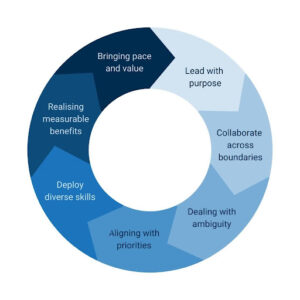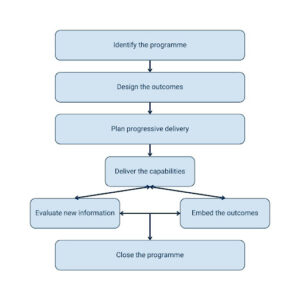Valentines sale - up to 30% off training courses – use code: VALENTINES26SA
21 February 2017 | Updated on 25 October 2024
MSP Principles & Processes
The Managing Successful Programmes (MSP®) framework offers a structured approach to programme management, designed to help organisations navigate uncertainty, achieve strategic goals, and drive transf...
The Managing Successful Programmes (MSP®) framework offers a structured approach to programme management, designed to help organisations navigate uncertainty, achieve strategic goals, and drive transformative change.
The framework is underpinned by a set of principles and processes that provide best practice guidance for the management and coordination of multiple related projects. In this blog, we’ll explore the MSP principles and processes, highlighting their role in effective programme management.
MSP Principles
MSP identifies the following principles of effective programme management and provides recommendations for how to use them in practice.
Lead with purpose
Successful programmes must have a clear vision and strategic alignment. It’s important to ensure your programmes are driven by the organisation's long-term goals.
Collaborate across boundaries
Emphasising the importance of working collaboratively, this principle encourages programme managers to foster cross-functional teamwork both within the organisation and with external stakeholders.
Dealing with ambiguity
Programme management requires you to remain adaptable and resilient, enabling the team to manage ambiguity and change without losing sight of the end goal.
Aligning with priorities
Programmes should continuously align with evolving business priorities, remaining flexible and responsive to changes in strategy.
Deploy diverse skills
This principle encourages the recruitment and deployment of diverse talent that possess the right combination of technical and soft skills to deliver programmes effectively.
Realising measurable benefits
It’s crucial that your programmes deliver tangible and measurable benefits, so managers must ensure that benefits realisation is prioritised and tracked throughout the programme lifecycle.
Bringing pace and value
Ensure your programmes are executed efficiently, with a focus on timely delivery and value creation.
The importance of MSP Principles
Incorporating the MSP principles into programme management is crucial for ensuring successful outcomes. By emphasising stakeholder engagement, teamwork, and adaptability, MSP ensures that programmes remain on track and aligned with long-term organisational goals, even in volatile environments. The benefits of applying the MSP principles include improved decision-making, efficient resource allocation and higher programme success rates.
MSP processes
The processes within the MSP methodology offer a structure for the management and delivery of any programme.
Identify the programme
This initial process focuses on defining the vision, scope and objectives of the programme, and ensuring it aligns with the wider organisational strategy.
Design the outcomes
Define the planned outcomes of your programme, detail how you will take it from its current state to the desired future state. Focus on how you will deliver measurable benefits and value.
Plan progressive delivery
Create a roadmap for how you will deliver the programme. Break it down into manageable stages, allowing time for regular reviews and to make necessary adjustments in accordance with strategy changes or external conditions.
Deliver the capabilities
This process references the actual delivery of the programme. Consider how you plan to execute each individual project or workstream to achieve your overarching goals.
Embed the outcomes
This process ensures that any outputs from your programme are fully integrated into the business and that the anticipated benefits are realised, resulting in the delivery of long-term value.
Evaluate new information
Helping to ensure the programme remains aligned with organisational objectives, this process encourages the programme manager to evaluate any new information or changes that emerge and adapt plans accordingly.
Close the programme
This final process formally closes the programme once all objectives have been met and benefits realised. It involves ensuring a smooth transition of responsibilities, conducting a final review, and capturing lessons learned for future programmes.
Get an MSP qualification
Learn more about the principles and processes of MSP, and improve your programme management skills with our training courses. Our MSP Foundation and Practitioner courses are available as classroom, virtual, blended and e-learning.

